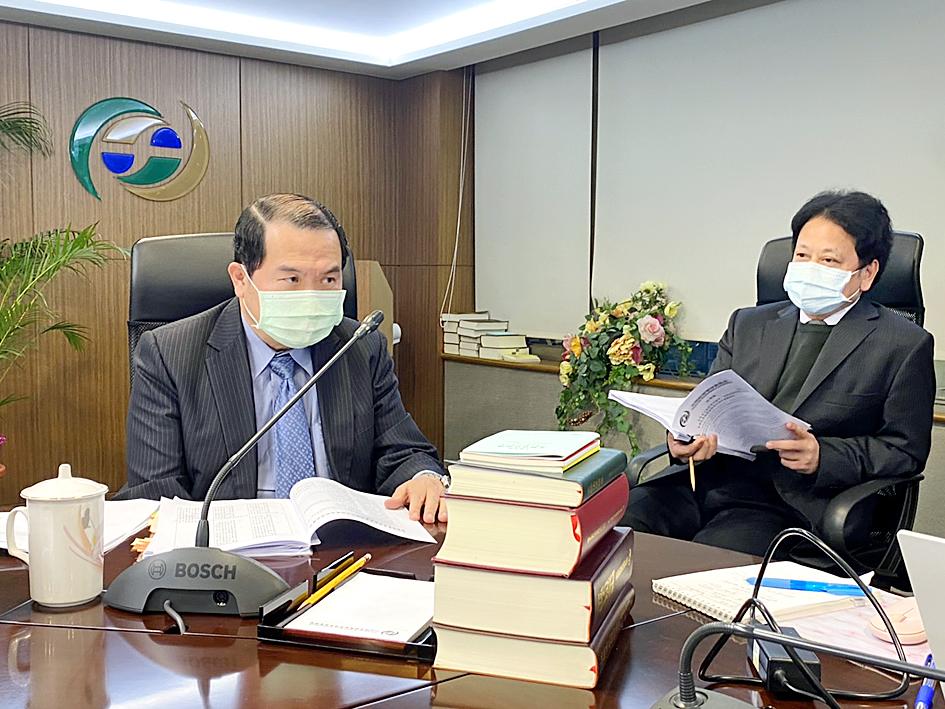The maximum reward for people who report financial crimes would be raised to NT$4 million (US$140,701) next week, a 10-fold increase to encourage whistle-blowers, the Financial Supervisory Commission (FSC) told a news conference in New Taipei City yesterday.
The maximum reward would be given to people who provide information that helps the commission uncover financial crimes in which companies or individuals are fined at least NT$10 million or sentenced to a minimum of three years in prison, FSC officials said.
The cap of NT$400,000 was increased in line with the commission’s goal of providing greater incentives for reporting, Financial Examination Bureau Deputy Director-General Chang Tzy-hao (張子浩) said.

Photo: Kao Shih-ching, Taipei Times
If a whistle-blower exposes a less-serious crime — where individuals or companies are fined between NT$5 million and NT$10 million, or sentenced to one year to three years in prison, they would receive NT$2 million, also 10 times the current reward, Chang said.
Rewards of NT$250,000 would be given for information leading to fines of between NT$1 million and NT$5 million, or jail terms of less than one year, he said, adding that this level is five times higher.
For lower-level crimes drawing fine of between NT$200,000 and NT$1 million, whistle-blowers would receive NT$50,000, also five times higher than the current amount, he said.
The commission last year issued a total of NT$305,000 in rewards to seven whistle-blowers, up from NT$50,000 in 2018 and NT$155,000 in 2019, it said.
It has paid NT$2.32 million in rewards since the program began, the FSC said.
The biggest single-case reward was NT$200,000, it said.
“There is a lot of room for increases in reporting on financial criminal activities,” Chang said.
Whistle-blowers can be internal or external to a company or institution, he said.
The commission would investigate information provided by anonymous whistle-blowers, but would not issue rewards in such cases, he said.
“A few anonymous whistle-blowers claimed rewards after reporting companies that were fined or sentenced. We verified their identity and paid them, as the information was helpful.” Chang said. “However, after next week’s increase in rewards, we would no longer pay out on anonymous tips.”
Most of the reports it has received in the past few years have been connected to illegal activities in securities investment consulting, he said.

MULTIFACETED: A task force has analyzed possible scenarios and created responses to assist domestic industries in dealing with US tariffs, the economics minister said The Executive Yuan is tomorrow to announce countermeasures to US President Donald Trump’s planned reciprocal tariffs, although the details of the plan would not be made public until Monday next week, Minister of Economic Affairs J.W. Kuo (郭智輝) said yesterday. The Cabinet established an economic and trade task force in November last year to deal with US trade and tariff related issues, Kuo told reporters outside the legislature in Taipei. The task force has been analyzing and evaluating all kinds of scenarios to identify suitable responses and determine how best to assist domestic industries in managing the effects of Trump’s tariffs, he

TIGHT-LIPPED: UMC said it had no merger plans at the moment, after Nikkei Asia reported that the firm and GlobalFoundries were considering restarting merger talks United Microelectronics Corp (UMC, 聯電), the world’s No. 4 contract chipmaker, yesterday launched a new US$5 billion 12-inch chip factory in Singapore as part of its latest effort to diversify its manufacturing footprint amid growing geopolitical risks. The new factory, adjacent to UMC’s existing Singapore fab in the Pasir Res Wafer Fab Park, is scheduled to enter volume production next year, utilizing mature 22-nanometer and 28-nanometer process technologies, UMC said in a statement. The company plans to invest US$5 billion during the first phase of the new fab, which would have an installed capacity of 30,000 12-inch wafers per month, it said. The

Taiwan’s official purchasing managers’ index (PMI) last month rose 0.2 percentage points to 54.2, in a second consecutive month of expansion, thanks to front-loading demand intended to avoid potential US tariff hikes, the Chung-Hua Institution for Economic Research (CIER, 中華經濟研究院) said yesterday. While short-term demand appeared robust, uncertainties rose due to US President Donald Trump’s unpredictable trade policy, CIER president Lien Hsien-ming (連賢明) told a news conference in Taipei. Taiwan’s economy this year would be characterized by high-level fluctuations and the volatility would be wilder than most expect, Lien said Demand for electronics, particularly semiconductors, continues to benefit from US technology giants’ effort

‘SWASTICAR’: Tesla CEO Elon Musk’s close association with Donald Trump has prompted opponents to brand him a ‘Nazi’ and resulted in a dramatic drop in sales Demonstrators descended on Tesla Inc dealerships across the US, and in Europe and Canada on Saturday to protest company chief Elon Musk, who has amassed extraordinary power as a top adviser to US President Donald Trump. Waving signs with messages such as “Musk is stealing our money” and “Reclaim our country,” the protests largely took place peacefully following fiery episodes of vandalism on Tesla vehicles, dealerships and other facilities in recent weeks that US officials have denounced as terrorism. Hundreds rallied on Saturday outside the Tesla dealership in Manhattan. Some blasted Musk, the world’s richest man, while others demanded the shuttering of his